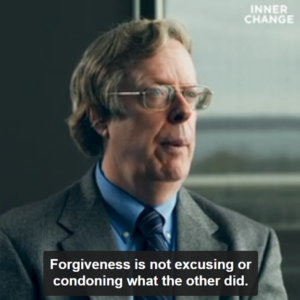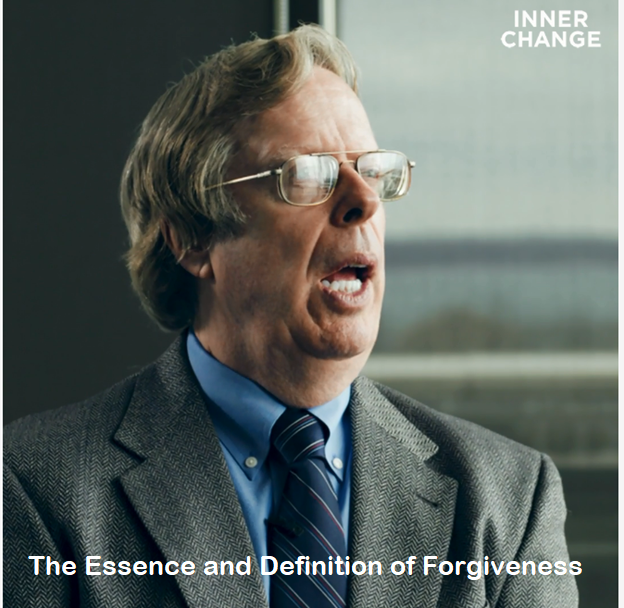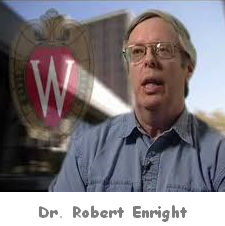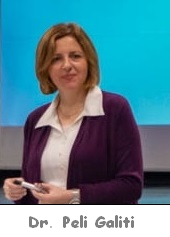Events
This is what forgiveness is not. . .
A newly-released video interview with forgiveness expert Dr. Robert Enright called “This is what forgiveness is not” is now available to view at no cost on the website Inner Change.
The 3 min. 22 sec. video was recorded by a film production studio based in Switzerland that has cinematic staff in the US and more than a dozen other countries around the world. It is one of 13 short video segments that Inner Change has recorded with Dr. Enright and which it will release over a 2-year period. Thus far, five of the Dr. Enright interviews have been made available:

Dr. Robert Enright, founder of the International Forgiveness Institute.
- This is what forgiveness is not – Dr. Enright outlines four aspects of what forgiveness is not:
- It is not excusing or condoning.
- It is not forgetting but remembering in new ways.
- It does not necessarily mean reconciliation although it could happen if the other becomes trustworthy.
- When you forgive, you do not throw justice away, you bring it alongside.
- The Essence and Definition of Forgiveness (2 min. 15 sec.) – In this interview, Dr. Enright defines forgiveness from an interdisciplinary, cross-cultural, and interfaith perspective that basically includes what Socrates would call the “essence” or “core” of forgiveness.
. - How I Became Involved in Forgiveness Studies (4 min. 16 sec.) – Dr. Enright explains how after years of studying moral development at the behest of his employer, the University of Wisconsin-Madison, he asked himself, “What might make a difference in the world in people’s lives?” The answer he came up with in 1985 was “the virtue of forgiveness” which he saw as a way to heal from the injustices we all face.
. - The Two Paradoxes of Forgiveness (1 min. 0 sec.) – In this brief segment, Dr. Enright outlines the two paradoxes (apparent contradictions that are not contradictions) of forgiveness: 1) by forgiving, you are giving unexpected goodness to the person who hurt you; and, 2) in the process, you become stronger and emotionally healed.
- Learning to Forgive in the Small Things (3 min. 19 sec.) – By practicing forgiveness with the smaller hurts in your life, what Dr. Enright calls “exercising your forgiveness muscles,” you can become forgivingly fit and more easily handle the larger injustices in life.
The Inner Change website includes interviews with psychologists, spiritual teachers, activists, and neurologists. Those interviews are part of the website’s “Peace Video Library” where visitors can “discover what it means to be fully human, what resources we all share, how we can tap into our full potential as humans.” Other website features include musical meditation segments following each video and a collection of more than 30 music videos all with original songs recorded at Chernobyl (the site of the 1986 nuclear power plant disaster in the Soviet Union) and the nearby ghost town of Prypiat in Northern Ukraine.
The Transformative Power of Storytelling
A new and innovative online training course is now available through The Forgiveness Project, a London (UK)-based organization that collects and shares stories of forgiveness in order to build hope, empathy and understanding.
“Working with stories of lived experience – the transformative power of storytelling,” draws on The Forgiveness Project’s 16-years of experience to explore approaches and perspectives relating to forgiveness, restorative narratives, shame, and resilience. The course also offers tools and techniques to build participants’ knowledge of and the use of storytelling in their work.
An introductory forum kicks off the course and is followed by five 3-hour sessions starting in July. Participants are expected to devote an estimated 3-4 hours of their own time between the sessions exploring and trying out different creative approaches. Because of the difficult subject matter being covered, all potential participants will be interviewed prior to final acceptance into the course and enrollment will be capped at 18 participants.
Marina Cantacuzino, MBE, The Forgiveness Project founder, and Sandra Barefoot, the organization’s Programme Development Lead, will facilitate the course. Cantacuzino is an award-winning journalist who embarked on a personal project in 2003 collecting stories of people who had lived through trauma and injustice, and who sought forgiveness rather than revenge. Barefoot, among her various responsibilities, is the manager of the organization’s prison program, RESTORE, and the lead facilitator of that work for the past eleven years. Course participants will be offered one-to-one mentoring time with each of the two facilitators.
Learning objectives and detailed course information is available on The Forgiveness Project’s “Working with stories of lived experience” website page. Cost of the course is £950 GBP (~ $1,350 USD) for individuals and £1350 GBP (~ $1,900 USD) for organizations.
“The Forgiveness Project shares stories of forgiveness in order to build hope, empathy and understanding.”
As the title of this innovative course suggests, storytelling can indeed embody the power to transform lives. That power is exhibited in the hundreds of personal stories shared on The Forgiveness Project website from both victims/survivors and perpetrators of crime and conflict who have rebuilt their lives following hurt and trauma.
That reliance on storytelling is also a crucial component of the strategy employed by the International Forgiveness Institute (IFI). Co-founder Dr. Robert Enright has incorporated storytelling (through the use of childrens’ literature) into most of the 17 Forgiveness Education Curriculum Guides developed by the IFI. Additionally, many of the same individuals featured on The Forgiveness Project website have been featured on the IFI website including:
- Archbishop Desmond Tutu, the 1984 Nobel Peace Prize winner for his opposition to SouthAfrica’s brutal apartheid regime, forgave those who tortured him and established a nonviolent path to liberation for his country. Archbishop Tutu is a “Founding Patron” of The Forgiveness Project and an Honorary Member of the IFI Board of Directors.
- Eva Mozes Kor, the Holocaust survivor who forgave her Auschwitz persecutors and who partnered with Dr. Enright on various media and personal projects before her death on July 4, 2019.
. - Anne Gallagher, a Belfast, Northern Ireland nurse who: 1) tended to victims of bombs and bullets on both sides of the sectarian divide; 2) founded Seeds of Hope, an organization that facilitates storytelling based on The Troubles; and, 3) helped the IFI establish Forgiveness Education Programs in Belfast schools more than 19-years ago—programs that are still operating today.
. - Thordis Elva and Tom Stranger—Elva was a 16-year-old student in Iceland when she was raped by 18-year-old Stranger (an exchange student from Australia). She later forgave her attacker and the two have since appeared together in countless presentations and co-authored a book South of Forgiveness.
Stories like those and the many others featured on the websites of The Forgiveness Project and the International Forgiveness Institute demonstrate that forgiveness is first and foremost a personal journey with no set rules or time limits. True forgiveness is also a testament to the resilience of the human spirit and an alternative to the cycles of conflict, violence, crime and injustice so prevalent around the world.
The Essence and Definition of Forgiveness
A just-released video interview with forgiveness guru Dr. Robert Enright called “The Essence and Definition of Forgiveness” is now available to view at no cost on a website called Inner Change which bills itself as “a video journey into our collective humanity.”
The 2 min. 15 sec. video was recorded by a talented group of film producers based in Switzerland that has cinematic staff in the US and more than a dozen other countries around the world. It is one of 13 short video segments that Inner Change has recorded with Dr. Enright and which it will release over a 2-year period. Thus far, four of the Dr. Enright interviews have been made available for viewing including:
- The Essence and Definition of Forgiveness (2 min. 15 sec.) – In this interview, Dr. Enright defines forgiveness from an interdisciplinary, cross-cultural, and interfaith perspective that basically includes what Socrates would call the “essence” or core of forgiveness. He concludes by adding that the highest form of forgiveness is to unconditionally love those who hurt us.
- How I Became Involved in Forgiveness Studies (4 min. 16 sec.) – Dr. Enright explains how after years of studying moral development at the behest of his employer, the University of Wisconsin-Madison, he asked himself, “What might make a difference in the world in people’s lives?” The answer he came up with in 1985 was “the virtue of forgiveness” which he saw as a way to heal from the injustices we all face.
- The Two Paradoxes of Forgiveness (1 min. 0 sec.) – In this brief segment, Dr. Enright outlines the two paradoxes (apparent contradictions that are not contradictions) of forgiveness: 1) by forgiving, you are giving unexpected goodness to the person who hurt you; and, 2) in the process, you become stronger and emotionally healed.
- Learning to Forgive in the Small Things (3 min. 19 sec.) – By practicing forgiveness with the smaller hurts in your life, what Dr. Enright calls “exercising your forgiveness muscles,” you can become forgivingly fit and more easily handle the larger injustices in life.

Dr. Robert Enright, founder – International Forgiveness Institute
The Inner Change website includes interviews with psychologists, spiritual teachers, activists, and neurologists. Those interviews are part of the website’s “Peace Video Library” where visitors can “discover what it means to be fully human, what resources we all share, how we can tap into our full potential as humans.” Other website features include musical meditation segments following each video and a collection of more than 30 music videos all with original songs recorded at Chernobyl (the site of the 1986 nuclear power plant disaster) and the nearby ghost town of Prypiat in Northern Ukraine.
Other notable forgiveness-related personalities featured on the site include:
1) Marina Cantacuzino, founder of the Forgiveness Project, a nonprofit that collects and shares stories from both victims/survivors and perpetrators of crime and conflict who have rebuilt their lives following hurt and trauma;
2) Bill Pelke who forgave the young woman who murdered his grandmother by stabbing her 33 times with a butcher knife and who went on to found an organization called Journey of Hope–from violence to healing that provides support to families of murder victims; and,
3) Dr. Andrew Newberg, a physician and neuroscientist who studies the relationship between brain function and various mental states who is also a pioneer in the neurological study of religious and spiritual experiences (a field known as “neurotheology”) as demonstrated in his recent book The Rabbi’s Brain.
Free on YouTube – Watch Dr. Robert Enright’s Greek Forgiveness Education Presentation
In case you missed it, you can now watch Dr. Robert Enright’s presentation during yesterday’s (Feb. 4) Greek Forgiveness Education webinar, on YouTube–for free. Details about the webinar can be found in the article posted immediately below this one.
The unique webinar was broadcast live via Zoom video conferencing from Greece. More than 4,500 individuals participated in the webinar or have watched the YouTube video since it was posted.
Dr. Enright, Professor of Educational Psychology at the University of Wisconsin-Madison and founder of the International Forgiveness Institute (IFI) was the featured presenter for the webinar. His topic, “The Healing Value of Forgiveness from the Aristotelian Philosophical Perspective,” has special significance in Greece because Greek philosophers like Aristotle not only helped shape the world some twenty centuries ago, but they are still very much alive in the principles underlying what is being taught in the country today.
“I have been relying on Aristotle for 35 years,” Dr. Enright said in his opening remarks during the webinar–the same length of time he has been studying the “moral virtue” (Aristotle’s term) of forgiveness. “The English translation of what Aristotle described as a moral virtue is ‘magnanimity’ or ‘largeness of heart,’” Dr. Enright added–what he calls the very essence of forgiveness.
Following Dr. Enright’s presentation, Dr. Peli Galiti, Director of the IFI’s Greek Forgiveness Education Program spoke on “The Way to Forgiveness: From Theory to Practice.” For the past eight years, Dr. Galiti has been conducting Forgiveness Education training workshops for Greek teachers. During that time, she has trained more than 600 teachers to use the Forgiveness Education Program developed by Dr. Enright which is now being taught to more than 6,000 Greek students.
Free Forgiveness Education Webinar on Feb. 4 Featuring Dr. Robert Enright and Dr. Peli Galiti
FORGIVENESS:
PRACTICAL APPLICATIONS OF A TIMELESS VIRTUE
Live Internet Event
Thursday, February 4, 2021
7:00 p.m. EET (Eastern European Time)
MEETING TIME CONVERSIONS
U.S. – EST – Noon
U.S. – CST – 11:00 a.m.
U.S. – MST – 10:00 a.m.
U.S. – PST – 9:00 a.m.
GMT – 5:00 p.m.
REGISTRATION REQUIRED NO LATER THAN TUESDAY, FEBRUARY 2, 2021
The program for this one-of-a-kind free webinar includes presentations by:
- Robert Enright, Professor of Educational Psychology at the University of Wisconsin-Madison and founder of the International Forgiveness Institute (IFI) – “The healing value of forgiveness from the Aristotelian philosophical perspective.”
- Peli Galiti, Researcher in the Department of Educational Psychology at the University of Wisconsin-Madison and Director of the IFI’s Greek Forgiveness Education Program – “The Way to Forgiveness: From Theory to Practice.”
- Konstantinos Kornarakis, Professor of Christian Ethics – Bioethics in the Department of Theology of the Theological School of the National and Kapodistrian University of Athens – “Functional and dysfunctional aspects of forgiveness in texts of the ascetic Christian literature.”
- Konstantinos Bikos, Professor of School Pedagogy and New Technologies in the Department of Philosophy and Pedagogy, the Aristotle University of Thessaloniki – “Socio-emotional and moral development of the Greek student: the contribution of education to forgiveness.”
The webinar has been organized by Dr. Peli Galiti, Ph.D., M.Ed., and her associates at the University of Athens (where she was previously a lecturer in the University’s School of Education) and the Aristotle University of Thessaloniki (A.U.Th.). For the past eight years, Dr. Galiti has been conducting Forgiveness Education training workshops for Greek teachers and for the past five years that training has been in collaboration with A.U.Th. During those eight years she has trained more than 600 teachers to use the Forgiveness Education Program which is now being taught to more than 6,000 Greek students.
The author of two books, Dr. Galiti has received funding for her work in Greece from the prestigious Stavros Niarchos Foundation, established by Stavros Spyros Niarchos, an Athens native who assembled and operated the largest shipping fleet in the world before his death in 1996. A descriptive video (4 min. 11 sec.) of the Greek Forgiveness Program is available at this YouTube link or you can visit the Greek Forgiveness Education website.
The International Forgiveness Institute’s widely-acclaimed Forgiveness Education Program was developed by Dr. Enright along with collaborating curriculum experts and experienced teachers. Using children’s story books (many by Dr. Seuss) and Social Emotional Learning (SEL) techniques, the Program teaches students about the five moral qualities most important to forgiving another person–inherent worth, moral love, kindness, respect and generosity. The Program is now being used in more than 30 countries around the world.
Additional Webinar Information: 1) Dr. Enright’s opening presentation will be delivered in English while the other three presentations will be in Greek with no English translation or subtitles; 2) The event will take place online on the ZOOM platform for free; 3) Registration must be completed by Tuesday, Feb. 2; and, 4) The link to the meeting will be sent to registered participants by e-mail on the eve of the event; and, 5) More than 700 people have already registered for the webinar.
Registration Form Translations:
1. Last name:
2. First name:
3. Email address:
4. Questions(s) you would like to ask the speakers about forgiveness (optional):
5. Which speaker(s) should answer your question (optional):
6. I accept the Privacy Policy:
7. I would like to receive more information about similar events (I Agree/Disagree):





